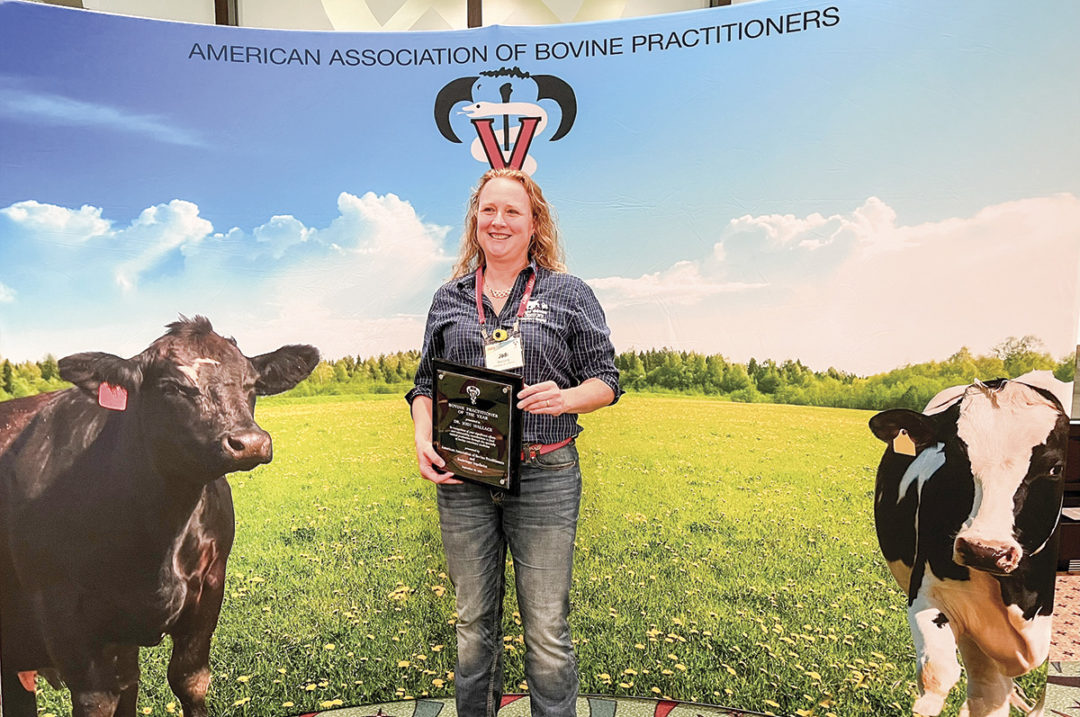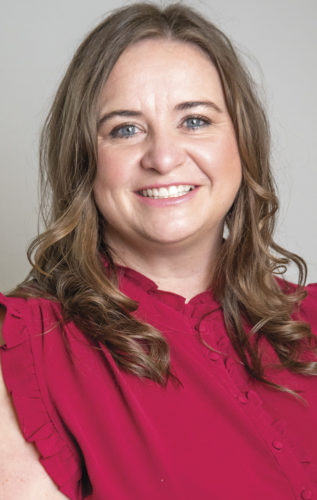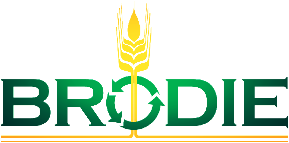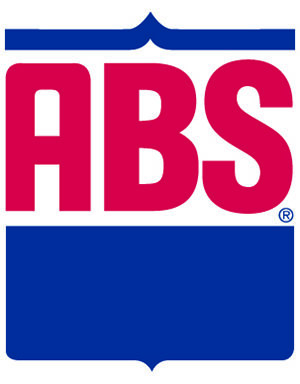To read this article in French, click here.
This past fall, Dr. Jodi Wallace was honoured with the Bovine Practitioner of the Year Award by the American Association of Bovine Practitioners. She is the second Canadian woman to achieve this recognition and holds the distinction of being the first recipient from Quebec.
Wallace is a sixth-generation dairy farmer who grew up on an Ayrshire farm in Herdman, Quebec. In 2002, she received a degree in veterinary medicine from the University of Guelph. She began her career at Cornell University in New York in quality milk production services before going to a dairy practice in Mirabel, Quebec.
In 2004, Wallace returned home to Ormstown, Quebec, where she continued to work as a farm animal veterinarian and became an associate owner at the Ormstown Veterinary Hospital, while completing her Masters of Veterinary Science from the University of Montreal in 2009. In addition to everyday veterinary practice, she performs calf health and milk quality consultations and conferences for dairy producers and veterinarians throughout Canada and abroad.
Wallace lives with her husband, Mark Anderson, and four children on their dairy, Anderson Farms, home to Silverstream Holsteins in Howick, Quebec. Their farm is focused on zero-zero calf health and was recently awarded the prestigious award of third place in the gold category of the National Order of Agriculture Merit. She is the current president of the Canadian Bovine Vet Association.
What was the first thing that came to mind when you realized you were the 2023 recipient of the Bovine Practitioner of the Year Award?
WALLACE: I was overwhelmed with emotion. I wished my husband and kids were there. I was in shock.
I was proud and humbled at the same time. I then realized I had to go up on stage and give an acceptance speech, which I was not prepared to do. There were just under 1,000 people in the room, and I fought back tears as I approached the stage.
This is the biggest honour that a bovine veterinarian can receive. I was flushed with emotions as I stood at the podium, speechless and staring at the crowd. I caught Dr. Ken Leslie’s eye, he was smiling ear to ear (I found out later that he was one of [the] people who nominated me), and beside him was Dr. Kerry Lissemore, both people who were instrumental mentors in my career. Immediately, I remembered a line from Kerry’s speech from the day before when he was recognized with an honourary life membership award and started speaking to the crowd saying, “The greatest award is to be recognized by your peers” – the statement hit home as I stood at the podium. I will never forget this very special moment and the recognition bestowed on me by my colleagues. I am forever grateful to Dr. Kelly Barratt, who nominated me for this award and was the first woman ever to receive this award.
How do you think your accomplishments have influenced the industry, and what changes do you hope to see because of your work?
WALLACE: Much of my work has focused on improving milk quality and calf health. My master's degree work focused on the validation of the Petri films for mastitis differentiation. This test has since been used across the country and internationally on-farm and in vet clinics for mastitis diagnosis.
I have also used the Lactocorder to observe milking procedures since 2002. I’ve done many farm and vet clinic visits across Canada, talking about the importance of a complete milk quality management program. I think these points have helped improve milk quality in Canada.
In addition, with the help of my husband, we’ve introduced the concept of zero-zero calf care. This is managing calves for zero treatments and zero losses. I enjoy transferring knowledge of the management practices that help producers get closer to zero-zero. Helping spread information and practice tips to improve management of calves has improved calf welfare and reduced unnecessary antibiotic usage.
What do you consider to be the most fulfilling aspect of your work?
WALLACE: Building relationships with my clients. I take great pride in seeing a farm improve as they obtain their goals. Of course, I love cows. I love working to improve their well-being. I also enjoy sharing information via consulting, giving presentations and writing articles.
In what ways do you believe your experiences and contributions have helped pave the way for other women in the industry?
WALLACE: Hopefully, it will demonstrate that anything is possible. Women can have a professional career and raise a family. There are no limits. But nothing is given, everything is earned. It takes hard work, sacrifice, discipline and many early mornings and late nights. Most importantly, it takes supportive family, friends and colleagues.
How do you plan to build upon the momentum generated by this award – what’s next for you?
WALLACE: I hope to raise awareness for the importance of being a member of the Canadian Association of Bovine Practitioners (CABV) and the American Association of Bovine Practitioners (AABP). Continuing education and a strong support network are key to any successful career. With this award, the AABP and Boehringer Ingelheim donate a $1,500 scholarship to a student to the vet school of my choice. Therefore, I look forward to presenting a dairy-focused veterinary student from the faculty of veterinary medicine from the University of Montreal, this scholarship.
I want to get more students interested in large-animal practice. I also plan on continuing to speak at producer meetings across the country and abroad about the importance of calf care.
What are your thoughts about incorporating technology and innovation into your day-to-day practice?
WALLACE: I love the idea. We must embrace change. I look forward to the day when there is reliable artificial intelligence for lameness detection, body condition scoring, facial recognition for cattle ID, etc. We are a very progressive group at the Ormstown Veterinary Hospital – if there is new technology that can be used to improve our practice, we are on board.
What challenges and opportunities do you foresee for your fellow bovine practitioners and dairy producers in the future?
WALLACE: A major challenge that the dairy industry faces are labour shortages. Veterinarian and vet tech shortages are a major issue, especially in rural areas. The labour shortage is a challenge on dairies as well, with many farms relying on foreign labour. Increased land prices are a harsh reality for producers, making it difficult for expansion and transfer to future generations. Mental health is challenged with increased workloads and decreasing margins.
What advice would you give to bovine practitioners and veterinarians aspiring to make a significant impact in this field, based on your own journey and the lessons you've learned along the way?
WALLACE: Get out and see as much as you can. My 4-H years have taught me “Learn by Doing” and to get your hands and boots dirty. Shadow people doing the things you want to learn. Apply for internships and read every magazine available to learn the industry. You don’t have to come from a farm to be a farm vet – if you are committed to improving and learning, you can be a vet.
When you think about the dairy industry, what makes you most excited?
WALLACE: I’m excited for the next generation of dairy farmers and dairy vets. These individuals are motivated and extremely knowledgeable. They like to challenge the existing status quo. This leads to innovation and change – we always need to ask how we can improve the current situation.
Is there anything else you would like to share about your special award?
WALLACE: This award is a team award. There is no way I could be here if it wasn’t for everyone who supported me. For that, I want to give a huge shout-out to everyone I’ve worked with over the years. Thank you!











